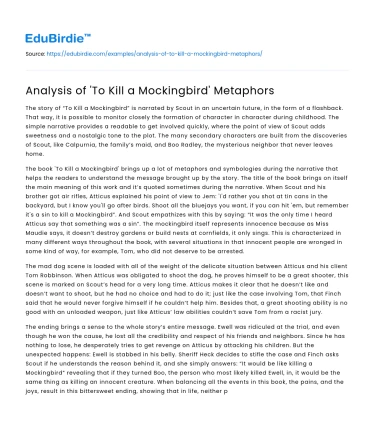The story of “To Kill a Mockingbird” is narrated by Scout in an uncertain future, in the form of a flashback. That way, it is possible to monitor closely the formation of character in character during childhood. The simple narrative provides a readable to get involved quickly, where the point of view of Scout adds sweetness and a nostalgic tone to the plot. The many secondary characters are built from the discoveries of Scout, like Calpurnia, the family’s maid, and Boo Radley, the mysterious neighbor that never leaves home.
The book 'To Kill a Mockingbird' brings up a lot of metaphors and symbologies during the narrative that helps the readers to understand the message brought up by the story. The title of the book brings on itself the main meaning of this work and it’s quoted sometimes during the narrative. When Scout and his brother got air rifles, Atticus explained his point of view to Jem: 'I'd rather you shot at tin cans in the backyard, but I know you'll go after birds. Shoot all the bluejays you want, if you can hit 'em, but remember it's a sin to kill a Mockingbird”. And Scout empathizes with this by saying: “It was the only time I heard Atticus say that something was a sin”. The mockingbird itself represents innocence because as Miss Maudie says, it doesn’t destroy gardens or build nests at cornfields, it only sings. This is characterized in many different ways throughout the book, with several situations in that innocent people are wronged in some kind of way, for example, Tom, who did not deserve to be arrested.
Save your time!
We can take care of your essay
- Proper editing and formatting
- Free revision, title page, and bibliography
- Flexible prices and money-back guarantee
The mad dog scene is loaded with all of the weight of the delicate situation between Atticus and his client Tom Robbinson. When Atticus was obligated to shoot the dog, he proves himself to be a great shooter, this scene is marked on Scout’s head for a very long time. Atticus makes it clear that he doesn’t like and doesn’t want to shoot, but he had no choice and had to do it; just like the case involving Tom, that Finch said that he would never forgive himself if he couldn’t help him. Besides that, a great shooting ability is no good with an unloaded weapon, just like Atticus’ law abilities couldn’t save Tom from a racist jury.
The ending brings a sense to the whole story’s entire message. Ewell was ridiculed at the trial, and even though he won the cause, he lost all the credibility and respect of his friends and neighbors. Since he has nothing to lose, he desperately tries to get revenge on Atticus by attacking his children. But the unexpected happens: Ewell is stabbed in his belly. Sheriff Heck decides to stifle the case and Finch asks Scout if he understands the reason behind it, and she simply answers: “It would be like killing a Mockingbird” revealing that if they turned Boo, the person who most likely killed Ewell, in, it would be the same thing as killing an innocent creature. When balancing all the events in this book, the pains, and the joys, result in this bittersweet ending, showing that in life, neither pain nor happiness takes complete control of the situation.






 Stuck on your essay?
Stuck on your essay?

